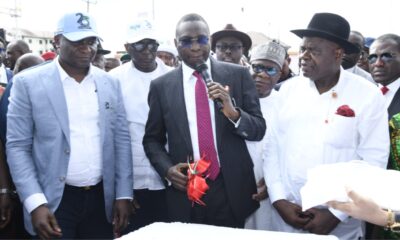Business
‘Nigeria Needs To Address Constraints Of Exportable Commodities’
The Minister of Budget and National Planning, Sen. Udoma Udo Udoma, has said that to build a competitive global economy, the nation needs to address constraints of other exportable commodities.
He said this during the public consultation on the 2018-2020 Medium Term Expenditure Framework, (MTEF) and Fiscal Strategy Paper, (FSP) with Civil Society Organisations (CSOs), the media and organised private sector in Abuja, Thursday.
According to him, the key thrusts of the framework are consistent with the Economic Recovery and Growth Plan,(ERGP) which is aimed at moving the nation away from dependence on a single commodity to run on multiple engines.
He affirmed that the nation was on track to achieving full recovery and growth, adding that, it needs to look inwards to boost non oil revenues and observe fiscal prudence at all levels.
“It is important that we build a globally competitive economy because this dependence on crude oil for our foreign exchange is not sustainable and so we have to get other commodities to export.
“In order to export them, they have to be competitive.
“Therefore, we have to address all the constraints that are not making our goods competitive so that we can grow what we eat, produce what we consume and have enough for export.”
Udoma said the key assumptions and macro-framework of the 2018 budget were predicated on oil production of 2.3 million barrels per day (mbpd), oil price of 45 dollars per barrel and an exchange rate of N305 to one dollar.
He also said the inflation rate was pegged at 12.42 per cent and Gross Domestic Product (GDP) growth rate was 4.8 per cent.
It was projected in the MTEF that oil production would be 2.4 mbpd in 2019, 2.5 mbpd in 2020, while exchange rate was retained at N305 to one dollar for 2019 and 2020.
Inflation was projected to stay at 13.39 per cent in 2019 and 9.90 per cent in 2020.
Udoma said the medium term fiscal policies were directed at achieving macro-economic stability, accelerating growth, intensifying economic diversification and promoting inclusiveness.
“We are focusing on stabilising the macro-economic environment, align monetary, trade and fiscal policies, accelerate non-oil revenue generation, drastically cut costs and privatise selected public enterprises and assets.”
He also said the Federal Government would enhance oil revenues and accelerate non-oil revenues through policies by transitioning from the traditional Joint Venture (JV) cash call budget to the self funding mechanism.
Other objectives are improved tax and customs administration, tightening of tax exemptions (including duty waivers), possible review of Value Added Tax (VAT) rate and excise duty, commencing with luxury items.
He recalled that the acting President, Prof. Yemi Osinbajo recently signed an Executive Order giving amnesty for voluntary compliance with tax, adding that he believes that Nigerians would come forward to pay their taxes.
Udoma also said the Federal Government aims to address recurrent and capital spending imbalance with continuous allocation of at least 30 per cent of its budgeted expenditure on capital projects.
“It will also maintain deficit and debts within sustainable limits,” he said.
Director-General, Debt Management Office (DMO), Ms Patience Oniha, said the nation had to fund its budget through borrowing, adding that, it was not defaulting in its debt responsibilities, rather it was capable of paying what it owed.
She, however, said the nation was not borrowing outside the limits set for it by the Fiscal Responsibility Commission (FRC) as it was still within it, which means that the debt it had incurred was sustainable.
She also said if the nation could increase its revenue significantly to enable implementation of the budget then it could achieve the growth it was looking at.
Some of the CSOs applauded Federal Government’s efforts in involving them and other Nigerians in the preparation of the document, adding that it would enhance transparency and accountability in the process.
The MTEF/FSP is a three-year planning tool that defines government’s economic, social and development objectives and priorities.
Business
NPA Assures On Staff Welfare
Business
ANLCA Chieftain Emerges FELCBA’s VP
Business
NSC, Police Boost Partnership On Port Enforcement
-
Sports5 days ago
Spanish Football Fires Entire Refereeing Committee
-

 Features5 days ago
Features5 days agoBetween EFCC And NDDC: Strategic Alliance For Niger Delta
-

 News5 days ago
News5 days agoCourt Sentences Gospel Singer To Death For Killing Girlfriend In Nasarawa
-

 Politics5 days ago
Politics5 days agoMakinde Renames Polytechnic After Late Ex-Gov
-
Sports5 days ago
Olympic Day Sparks Nationwide Fitness Fever
-

 Nation5 days ago
Nation5 days agoOgoni Stakeholders Hail Zabbey’s Performance
-
Sports5 days ago
I Joined Saudi League To Win Titles – Senegal Keeper
-

 Niger Delta5 days ago
Niger Delta5 days agoOBALGA Sole Administrator Presents Brand New Fire Extinguishers To Council …Commiserates With Traders Over Rumuomasi Market Fire Incident …Commences Desilting Of Drainages

